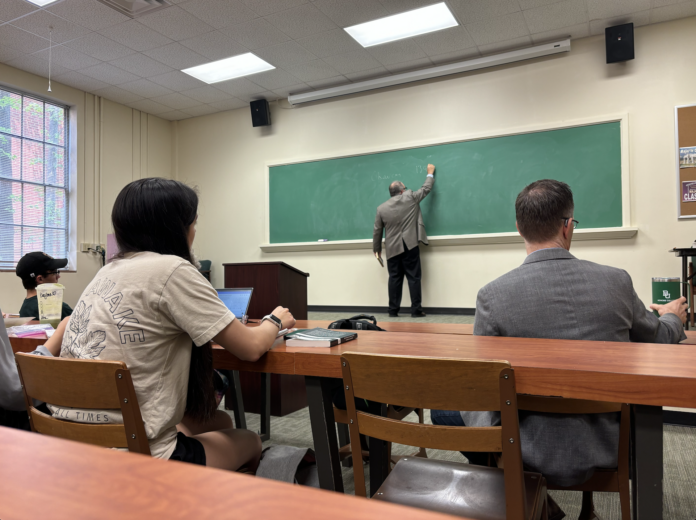
By Caitlyn Beebe | Reporter
With the 2024 presidential election around the corner, students will have the chance to study it in real time in PSC 3340 — a class on campaigns and elections.
Dr. Dave Bridge, associate professor of political science, said the class focuses on the institutions, rules and history of elections. When Bridge taught the class during the 2020 presidential election, around 250 students were enrolled.
“We spent a lot of time unpacking things as they were happening in real time,” Bridge said. “We all woke up the day after the [2020 presidential] election not knowing who won.”
Looking ahead to the 2024 election, Bridge said he sees hyper-partisanship as a growing issue. Bridge said it occurs when people source their beliefs from a party platform rather than from personal thought.
“You just have this immense faith in a party to always be right and intense distrust of the other party and that everything they’re doing is wrong,” Bridge said.
Bridge said while polarization has been increasing for the past 30 years, a spike in partisanship in the past decade has led to a distrust of the governmental process and a loss of ethics.
In response, Bridge said he emphasizes that students think institutionally, not politically. The difference comes down to one’s willingness to lose an election.
Bridge said thinking politically means prioritizing winning elections above all else.
“[It’s] as if winning this particular election, regardless of the methods, is more important than upholding constitutional democracy,” Bridge said.
In contrast, Bridge said thinking institutionally means considering the constitutional implications of one’s decision.
“When you’re thinking institutionally, you’re playing within the constitutional rules and the process,” Bridge said. “The longevity of the U.S. Constitution is more important than winning this particular election.”
Plano senior Sage Yassa took Bridge’s class in 2020. Yassa studies how Supreme Court decisions or impeachment processes are coopted into political tools.
“I hope we can find a way to go back to using these [institutions] the way they’re meant to be used and not just as an automatic tool to fight the other side,” Yassa said.
Yassa said mass social media data is an issue the 2024 election raises. Ever since social media played a pivotal role in the 2012 election, Yassa said both parties are likely to rely on activity data. Candidates are less likely to engage with constituents in person or to consider what is best for America.
“I think it definitely makes it less personal, less caring,” Yassa said.
Bridge said the 2024 election will provide insight into how parties balance big data with personalized messages.
In the fall, Bridge said he isn’t worried about in-class disagreements getting out of hand.
“Baylor students are the most tolerant I’ve ever taught,” Bridge said. “And by that, I mean that they really want to listen to people who disagree with them. They encourage others to speak their mind.”
Yassa said professors lead by example when it comes to disagreements. She said her professors always speak respectfully of all candidates during class discussions.
“We also, in political science, have professors who encourage nuanced thought, so look[ing] beyond the bucket you’ve put yourself in,” Yassa said.
Yassa said Bridge’s class helps provide historical context to young people. Learning history helps them be less shaken by new information or circumstances.
“The course forms you into someone who doesn’t react to every piece of information by freaking out and thinking that democracy in America is dead,” Yassa said. “It doesn’t have to be.”
Yassa said she encourages students of all classifications to consider taking Bridge’s class. She said having the opportunity to take it was one of the reasons she chose to attend Baylor.
“Freshmen should not be scared. Sophomores should not be scared. And juniors and seniors, even if they’ve taken quite a few political science classes, will find this one different and maybe refresh them as they finish off their undergraduate career,” Yassa said.





